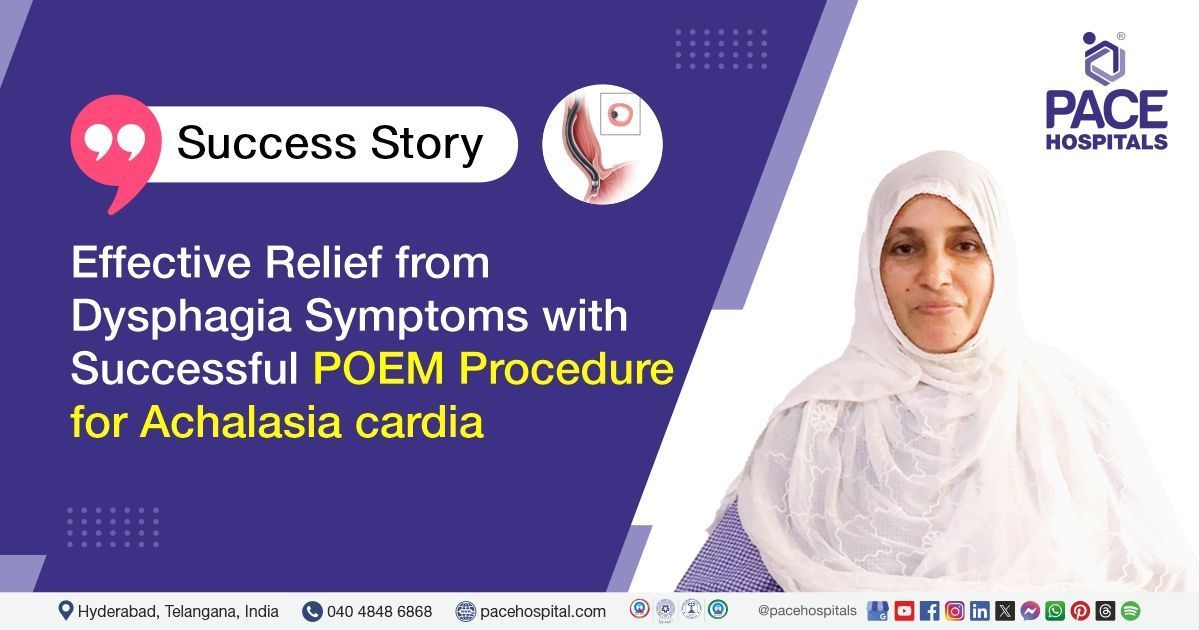Effective Relief from Dysphagia Symptoms with Successful POEM Procedure for Achalasia
PACE Hospitals
A 46-year-old female patient had been experiencing severe difficulty swallowing liquids and solids, along with a sensation of food getting stuck, for the past seven months. She was diagnosed with achalasia cardia type II based on oesophageal manometry and underwent a successful Peroral Endoscopic Myotomy (POEM) procedure.
Chief complaints
A 46-year-old female patient had been experiencing severe difficulty swallowing liquids and solids, along with a sensation of food getting stuck, for the past seven months. These symptoms had significantly affected her daily life, prompting her to seek medical attention.
Medical History
The patient had no significant past medical history of gastrointestinal conditions, except for the recent onset of dysphagia. The patient’s history also indicated a progressive decrease in the ability to swallow food and liquids, causing significant distress and nutritional challenges.
The patient was a known case of hypertension and had been taking Denovo tablets to manage the hypertension. There was no other known history of diabetes, cardiac diseases or other significant comorbidities.
On Examination
On examination, the patient appeared normal. The patient was conscious, cooperative, and oriented. No palpable abdominal mass was detected, and the respiratory examination revealed no signs of acute distress. Vital signs were stable, with no abnormalities, except for high blood pressure detected during the general examination.
The WBC count was found to be 14,220 cells per cubic millimeter (cu/mm), which exceeds the normal range of 4,000 to 11000. A count of 11,000 or higher is typically considered high and can be caused by various factors, including infection, inflammation, trauma, stress, and certain medications. Other systems were found to be within normal limits.
Diagnosis
The diagnosis was confirmed with an
upper gastrointestinal endoscopy (UGI) and oesophageal manometry, which revealed signs suggestive of
achalasia cardia. A chest X-ray (AP view) is done before POEM surgery to assess lung and heart health and rule out any pre-existing respiratory issues. The patient exhibited classic signs of achalasia, a disorder of the oesophagus that affects the ability of the lower oesophageal sphincter to relax, causing difficulty in swallowing.
Medical Decision Making (MDM)
Based on the clinical findings and investigation reports, the decision was made by the interventional gastroenterologist, transplant hepatologist, pancreatologist and endosonologist,
Dr. Govind Verma, along with Dr. Raya Venkatesh Reddy and
Dr. M Sudhir, to proceed with a
Peroral Endoscopic Myotomy (POEM) to treat achalasia cardia, a minimally invasive procedure that helps alleviate symptoms by cutting the muscle fibres of the lower oesophageal sphincter.
Treatment
The treatment involved performing Peroral Endoscopic Myotomy (POEM), a minimally invasive endoscopic procedure. This technique involves creating a submucosal tunnel within the oesophageal wall to access the lower oesophageal sphincter. A precise myotomy was then performed on the circular muscle fibres, effectively relieving the obstruction caused by the hypertonic sphincter. The procedure was completed successfully without any intraoperative complications, ensuring optimal conditions for postoperative recovery.
Post-Treatment
Post-operative recovery was uneventful, with no signs of infection or complications. She was started on IV fluids to maintain hydration and antibiotics to prevent any potential infections. Additionally, supportive management, including pain relief, was provided to ensure the patient’s comfort and facilitate recovery. The patient remained hemodynamically stable throughout the hospital stay, and no adverse symptoms such as fever, vomiting, or abdominal pain were noted.
For the first few days after surgery, the patient was managed with IV fluids, antibiotics, antihypertensives, and proton pump inhibitors PPIs.
Discharge Notes
The patient was discharged after a stable recovery. She was recommended to continue PPIs and expectorants as prescribed, a clear liquid diet for the next 7 days, followed by a liquid diet for seven more days, and then transition to a soft diet. In case of any emergency symptoms such as abdominal pain, fever, or vomiting, the patient was instructed to report to the emergency ward immediately.
The patient was also advised to follow up with Dr. Govind Verma in the outpatient department after 6 weeks to review her condition.
Advancements in Achalasia Treatment: POEM as a Less Invasive Alternative to Heller Myotomy
Achalasia is a rare condition where the oesophagus muscles don’t work properly, causing difficulty swallowing. It affects about 6 in 100,000 people each year, mostly young women. The problem is thought to be caused by nerve damage in the lower oesophagus, leading to increased pressure and loss of normal movement. Diagnosis starts with tests like a barium esophagram and endoscopy to rule out other conditions, followed by oesophagal manometry to confirm the diagnosis using the Chicago Classification.
POEM is a minimally invasive endoscopic procedure that treats swallowing disorders like achalasia. Over the past 10 years, the POEM procedure has become a widely accepted and effective treatment for achalasia, offering a less invasive alternative to laparoscopic Heller myotomy (LHM). By 2019, more than 100 studies were published on POEM, with a total of 769 studies available since 2010, highlighting its growing recognition and success in treating this condition.
Share on
Request an appointment
Fill in the appointment form or call us instantly to book a confirmed appointment with our super specialist at 04048486868
Appointment request - health articles
Recent Articles











